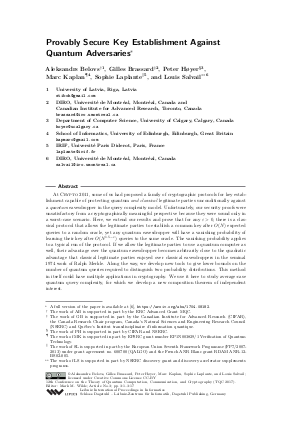Provably Secure Key Establishment Against Quantum Adversaries
Authors Aleksandrs Belovs, Gilles Brassard, Peter Høyer, Marc Kaplan, Sophie Laplante, Louis Salvail
-
Part of:
Volume:
12th Conference on the Theory of Quantum Computation, Communication and Cryptography (TQC 2017)
Part of: Series: Leibniz International Proceedings in Informatics (LIPIcs)
Part of: Conference: Conference on the Theory of Quantum Computation, Communication and Cryptography (TQC) - License:
 Creative Commons Attribution 3.0 Unported license
Creative Commons Attribution 3.0 Unported license
- Publication Date: 2018-03-14
File

PDF
LIPIcs.TQC.2017.3.pdf
- Filesize: 0.63 MB
- 17 pages
Document Identifiers
Subject Classification
Keywords
- Merkle puzzles
- Key establishment schemes
- Quantum cryptography
- Adversary method
- Average-case analysis
Metrics
- Access Statistics
-
Total Accesses (updated on a weekly basis)
0Document
0Metadata
Abstract
At Crypto 2011, some of us had proposed a family of cryptographic protocols for key establishment capable of protecting quantum and classical legitimate parties unconditionally against a quantum eavesdropper in the query complexity model. Unfortunately, our security proofs were unsatisfactory from a cryptographically meaningful perspective because they were sound only in a worst-case scenario. Here, we extend our results and prove that for any \eps > 0, there is a classical protocol that allows the legitimate parties to establish a common key after O(N) expected queries to a random oracle, yet any quantum eavesdropper will have a vanishing probability of learning their key after O(N^(1.5-\eps)) queries to the same oracle. The vanishing probability applies to a typical run of the protocol. If we allow the legitimate parties to use a quantum computer as well, their advantage over the quantum eavesdropper becomes arbitrarily close to the quadratic advantage that classical legitimate parties enjoyed over classical eavesdroppers in the seminal 1974 work of Ralph Merkle. Along the way, we develop new tools to give lower bounds on the number of quantum queries required to distinguish two probability distributions. This method in itself could have multiple applications in cryptography. We use it here to study average-case quantum query complexity, for which we develop a new composition theorem of independent interest.
Cite As Get BibTex
Aleksandrs Belovs, Gilles Brassard, Peter Høyer, Marc Kaplan, Sophie Laplante, and Louis Salvail. Provably Secure Key Establishment Against Quantum Adversaries. In 12th Conference on the Theory of Quantum Computation, Communication and Cryptography (TQC 2017). Leibniz International Proceedings in Informatics (LIPIcs), Volume 73, pp. 3:1-3:17, Schloss Dagstuhl – Leibniz-Zentrum für Informatik (2018)
https://doi.org/10.4230/LIPIcs.TQC.2017.3
BibTex
@InProceedings{belovs_et_al:LIPIcs.TQC.2017.3,
author = {Belovs, Aleksandrs and Brassard, Gilles and H{\o}yer, Peter and Kaplan, Marc and Laplante, Sophie and Salvail, Louis},
title = {{Provably Secure Key Establishment Against Quantum Adversaries}},
booktitle = {12th Conference on the Theory of Quantum Computation, Communication and Cryptography (TQC 2017)},
pages = {3:1--3:17},
series = {Leibniz International Proceedings in Informatics (LIPIcs)},
ISBN = {978-3-95977-034-7},
ISSN = {1868-8969},
year = {2018},
volume = {73},
editor = {Wilde, Mark M.},
publisher = {Schloss Dagstuhl -- Leibniz-Zentrum f{\"u}r Informatik},
address = {Dagstuhl, Germany},
URL = {https://drops.dagstuhl.de/entities/document/10.4230/LIPIcs.TQC.2017.3},
URN = {urn:nbn:de:0030-drops-85816},
doi = {10.4230/LIPIcs.TQC.2017.3},
annote = {Keywords: Merkle puzzles, Key establishment schemes, Quantum cryptography, Adversary method, Average-case analysis}
}
